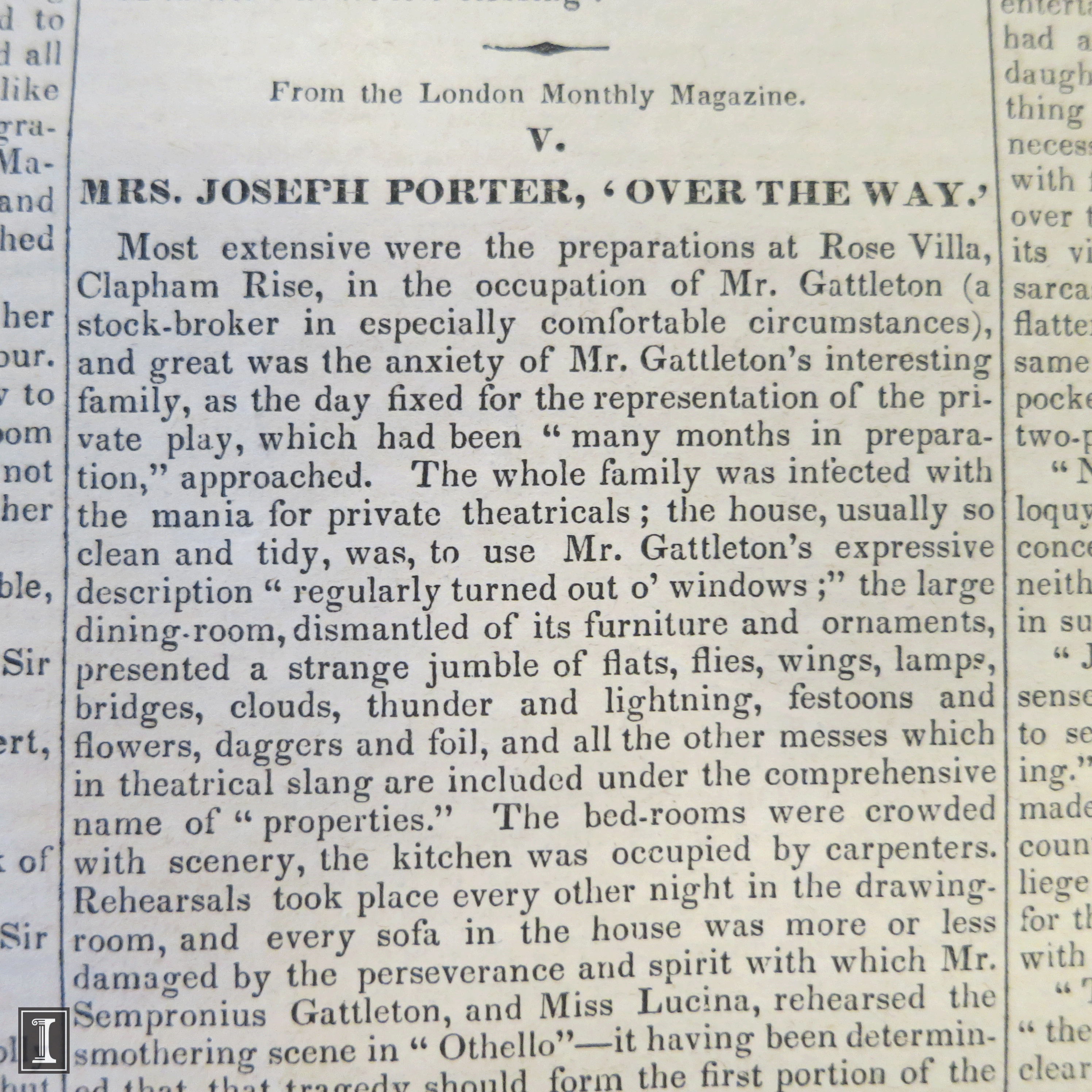Most know Charles Dickens as a great novelist, with a style so distinctive that it now bears his name. But Dickens fans might celebrate him for very different achievements, save for one bad cold.
Drama and theater played an important role in Dickens’ life from an early age. As a small and somewhat sickly boy, Dickens was unable to participate in athletic activities. Instead, he spent his time playing games of make-believe with friends, putting on magic lantern shows, and performing comic songs, sometimes alone, and sometimes with his older sister Fanny. The two even performed publicly at the Mitre tavern in Rochester, a neighboring town to Chatham, where the Dickens family lived during Dickens’ early years.
Due to his family’s difficult financial circumstances, in 1827, at the age of fifteen, Dickens left school to work as a solicitor’s clerk. However, in 1828 he left this position in hopes of making a career as a journalist. He taught himself the Gurney system of shorthand, and began to get some work with his uncle’s paper, the Mirror of Parliament. Journalism was not the only career that Dickens considered, though. Knowing that he had true talent as a performer, he obtained an audition at Covent Garden in the spring of 1832. He never attended the audition, however, due to a bad cold.
But though Dickens may have missed his chance to become a professional actor, he never lost his love of performing. Whether he was organizing amateur theatricals at his parents’ home or giving public readings of passages from his novels, Dickens seemed to always find some way to perform on a stage. It is fitting, then, that one of Dickens’ first published literary works revolves around family theatricals. “Mrs. Joseph Porter, ‘Over the Way’” tells the story of a private play staged by the Gattleton family of Clapham Rise. Witty and satirical, the tale also demonstrates Dickens’ great talent for crafting unforgettable characters. The true stars of the story (though they never once appear on the Gattleton family stage), are the Gattletons’ Uncle Tom and their notorious neighbor, Mrs. Joseph Porter. Uncle Tom, a Shakespeare devotee who has memorized “all the principal plays of Shakespeare from beginning to end,” unwittingly plays into Mrs. Porter’s scheme to sabotage the production, leading to disaster for the actors but much hilarity for their audience (and readers).
“Mrs. Joseph Porter, ‘Over the Way’” first appeared in print in January 1834 in the London Monthly Magazine. However, the Rare Book & Manuscript Library’s copy of the tale actually comes from the 26 August 1834 issue of Waldie’s Select Circulating Library, printed by Adam Waldie in Philadelphia. It is very likely that this printing is a piracy; due to a lack of any copyright agreement between the United States and Great Britain, American newspapers commonly pirated the works of British authors. In his History of American Magazines, Frank Luther Mott describes the situation thusly:
“[Newspaper printers] would have their messengers awaiting the steamships to board them before they docked, and receive the earliest copies of the new English novels; they would then rush the books into type by working large forces of typesetters night and day, and within twenty-four hours would have them on the streets . . . And the purchaser of a G. P. R. James or Dickens novel in eighty closely-printed quarto pages would forget the injury to his eyes in the saving to his pocketbook” (Mott 360).
Dickens spoke about piracy several times during his first visit to the United States in 1842; nevertheless, it was not until 1891, with the passing of the International Copyright Act in the United States, that any provisions existed for the protection of foreign authors’ works.
The Select Circulating Library version of “Mrs. Joseph Porter” is notable not just for its shady background. According to Richard Gimbel, a notable book collector whose Dickensiana collection now resides at Yale University’s Beinecke Rare Book & Manuscript Library, the piracy also represents the first American printing of any of Dickens’ work. The Rare Book & Manuscript Library is fortunate to have such a unique item, and we are grateful to the James M. & Mary Marsh Givens Library Endowment Fund for making the acquisition possible. Mary Marsh Givens earned a BA in English Education from the University of Illinois at Urbana-Champaign in 1951, and a master’s degree from San José State University in 1981. She and her husband James established the fund in 1990. The fund provides for the acquisition of materials by Charles Dickens as well as Dickensiana—that is, materials related to Dickens and his work. Thank you, Mary and James, for your support both of the Rare Book & Manuscript Library and of Charles Dickens! BS
Interested in learning more about the pirating of printed works? Make sure to visit our Fall 2015 Exhibit, Pirates of the Press, opening September 18th.
Sources:
Mott, Frank Luther. A History of American Magazines 1741-1850. Cambridge: Harvard UP, 1939. Print.
Post, David G. “Some Thoughts on the Political Economy of Intellectual Property: A Brief Look at the International Copyright relations of the United States.” David G. Post: Research & Writing. Temple University Beasley School of Law. September 2014. Web. 14 May 2015.
Slater, Michael. “Dickens, Charles John Huffam (1812–1870).” Oxford Dictionary of National Biography. Oxford: Oxford UP, 2014. Web. 14 May 2015.

